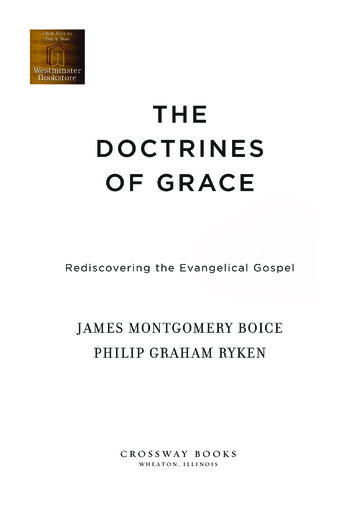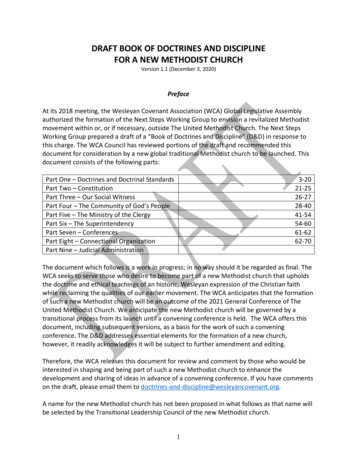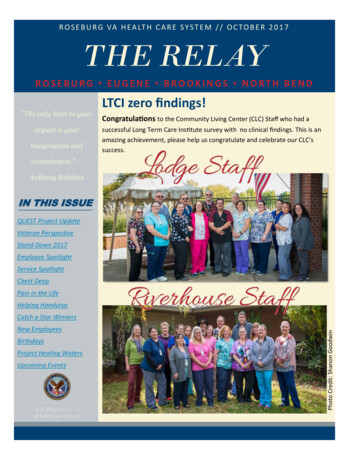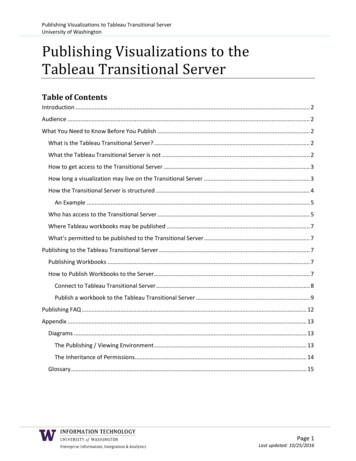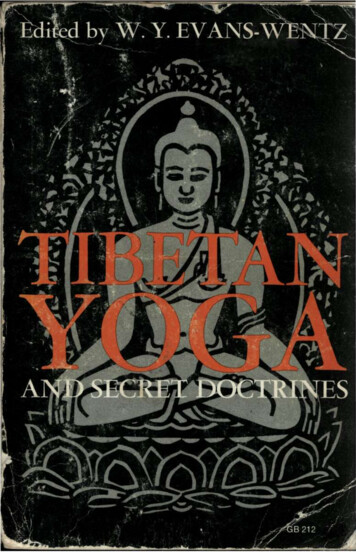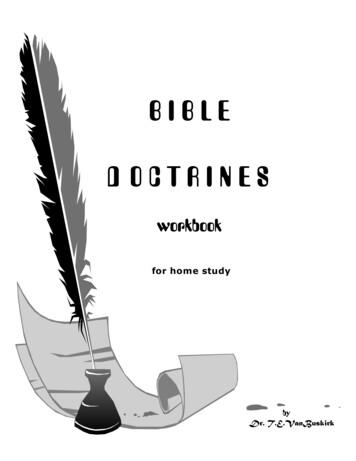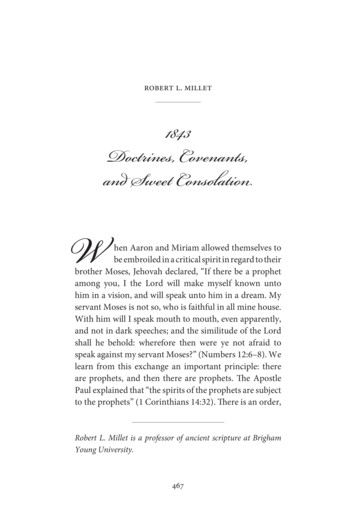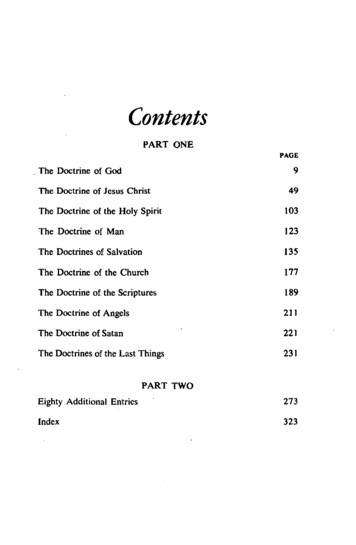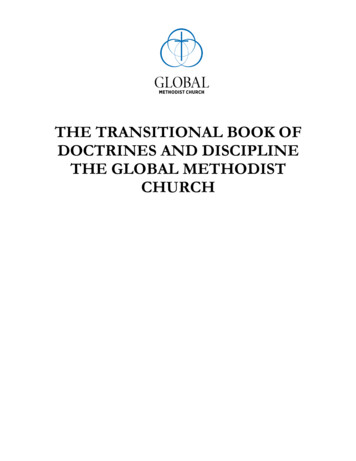
Transcription
THE TRANSITIONAL BOOK OFDOCTRINES AND DISCIPLINETHE GLOBAL METHODISTCHURCH
All Scripture quotations, unless otherwise indicated, are taken from the Holy Bible, New International Version ,NIV . Copyright 1973, 1978,1984, 2011 by Biblica, Inc. Used by permission. All rights reservedworldwide.2
PREFACESince its inception, God’s Spirit has enlivened the Methodist movement. In the 1720s John andCharles Wesley and friends at Oxford University met together to deepen their Christian faiththrough daily, practical spiritual disciplines. Derided by others as a “new sect of Methodists” fortheir “methodical” ways of practicing the faith and holding one another accountable to it, the smallgroup embraced the insult and persevered in their fellowship. And so they and the millions whofollowed after them have ever since been known as “the people called Methodists.”In that spirit, this Transitional Book of Doctrines and Discipline of the Global Methodist Church isintended to serve as a resource for all who wish to join in a “methodical,” practical, and warmhearted pursuit of loving God and serving others as Jesus’ disciples in the world. Beginning withconfessions rooted in Scripture and shaped by the great teaching of the Church universal, whatfollows is the Global Methodist Church’s outline for a new expression of Methodism that will belegally launched at a future date. It will provide an essential structure for the new church until itsconvening General Conference. Respecting the Methodist Episcopal Church’s establishedconvention in its original Book of Doctrines and Discipline (1784), this book is arranged using theparagraph (¶) system to allow for amendments and expansions as desired. It is offered with theprayer that it will help guide us in a new season of the church's life as we make disciples of Jesus Christwho worship passionately, love extravagantly, and witness boldly.We acknowledge with gratitude the work of a drafting team that assisted us in the development ofthis document: Rev. Thomas Lambrecht (Wisconsin), Rev. Dr. Chappell Temple (Texas), and Rev. JayTherrell, Esq. (Florida).This Transitional Book of Doctrines and Discipline will only be effective once the Global MethodistChurch is legally formed and will provide governance until the time specified by the GlobalMethodist Church’s convening General Conference.Transitional Leadership CouncilFebruary 1, 2021Rev. Keith Boyette, Esq., Chairperson, VirginiaRev. Philippe Adjobi, Cote d’IvoireRev. Dr. Joe Connelly, Esq., LouisianaBishop Lindsey Davis, KentuckyRev. Adrian Garcia, IllinoisRev. Dr. Jeff Greenway, OhioBishop Robert Hayes, TexasRev. Jay Hanson, GeorgiaRev. Dr. Leah Hidde-Gregory, TexasRev. Walter B. Fenton, Secretary, New JerseyBishop John Innis, LiberiaRev. Andrei Kim, RussiaSenator Patricia Miller (Ret.), IndianaRev. Dr. Martin Nicholas, TexasCara Nicklas, Esq., OklahomaRev. Keihwan Kevin Ryoo, CaliforniaGideon Salatan, Esq., PhilippinesRev. Steven Taylor, New York3
PART ONEDOCTRINE¶ 101. OUR HERITAGE OF FAITH. 1. As a Wesleyan expression of Christianity, the GlobalMethodist Church professes the Christian faith, established on the confession of Jesus as messiah,the Son of God, and resurrected Lord of heaven and earth. This confession, expressed by SimonPeter in Matthew 16:16-19 and Acts 2:32, is foundational. It declares Jesus is the unique incarnateWord of God, and He lives today, calling all to receive Him as savior, and as the one to whom allauthority has been given.2. This faith has been tested and proved since its proclamation by Mary Magdalene, the first witnessto the resurrection. It was defended by the women and men of the early church, many of whomgave their lives as testimony. Their labor, enabled and inspired by the Holy Spirit, resulted in thecanon of scripture as the sufficient rule both for faith and practice (the Greek word kanon meansrule). It formulated creeds such as the Apostles’ Creed, the Nicene Creed and the Chalcedoniandefinition as accurate expressions of this faith.3. In the sixteenth century, the Protestant reformers preserved this testimony, asserting the primacyof Scripture, the necessity of grace and faith, and the priesthood of all believers. Their doctrinalsummations, the Augsburg Confession, the Schleitheim Confession, the Anglican Articles of Religion, and theHeidelberg Catechism, bore witness to this faith.4. In the seventeenth and early eighteenth centuries, Pietists in all traditions sought to emphasize theexperiential nature of this faith, as direct encounter with the risen Lord. They worked to develop thefruit of this faith, by the power of the Holy Spirit, in individual and communal life. These pietisticmovements influenced many in the reformation traditions, including two Anglican brothers, Johnand Charles Wesley.5. Through the organization and published works by these brothers, a distinctly Methodistarticulation of Christian faith and life, of “practical divinity,” emerged. Methodism placed particularemphasis on the universal work of grace, the new birth, and the fullness of salvation, entiresanctification or perfection. Methodists created structures and communities alongside theestablished church to facilitate the mission “to reform the nation, especially the church, and spreadscriptural holiness over the land.”6. As Methodists moved to America, they brought this expression of faith with them. AlthoughMethodism in England remained loyal to the established church until after John Wesley’s death, theAmerican revolution dictated the formation of a new church, independent of the Church ofEngland. Accordingly, in 1784, while gathered in Baltimore for the “Christmas Conference,” theMethodist Episcopal Church was formally constituted.7. This new church adopted John Wesley’s revision of the Anglican Articles of Religion, theMethodist General Rules, a liturgy, and ordained the first Methodist clergy. Two other sources ofauthority were identified: the four volumes that included fifty-three of Wesley’s sermons and hisExplanatory Notes on the New Testament. When a constitution was adopted in 1808, the RestrictiveRules protected the Articles and General Rules from revocation or change.8. Other Methodist expressions of “primitive Christianity” and “the scripture way of salvation”emerged. German-speaking Americans from pietistic Reformed, Anabaptist, and Lutherantraditions, created organizations with doctrine and discipline nearly identical to the English-speakingMethodist Episcopal Church. The work of Phillip William Otterbein, Martin Boehm, and JacobAlbright established the United Brethren in Christ and the Evangelical Association. A number ofAfrican American Methodists, including Richard Allen, Jarena Lee, and James Varick, helped4
establish the African Methodist Episcopal Church and the African Methodist Episcopal Church,Zion to address racial discrimination and the injustices of slavery, while preserving doctrine anddiscipline.9. Through separations and mergers, Methodist Christians have preserved testimony to the risen andreigning Christ by holding themselves accountable to standards of doctrine and discipline. Beginningwith early Methodist work in the Caribbean, this Wesleyan understanding of doctrine has nowspread across the globe, flourishing with the unique contributions of many cultures. When TheUnited Methodist Church was formed in 1968, with the merger of The Methodist Church and theEvangelical United Brethren, both the Methodist Articles of Religion and the Evangelical UnitedBrethren Confession of Faith were accepted as doctrinal standards and deemed “congruent”articulations of this faith. For fifty years, the growing voices of Methodists in Africa, the Philippines,and Europe have joined in the engagement to maintain our doctrinal heritage, promoting fidelity tothe doctrinal principles that launched our movement. The Global Methodist Church preserves thisheritage.¶ 102. THE WESLEYAN WAY OF SALVATION. 1. The gift of grace is available to all persons.Our Father in Heaven is not willing that any should be lost (Matthew 18:14), but that all may cometo “the knowledge of truth” (1 Timothy 2:4). With St. Paul, we affirm the proclamation found inRomans 10:9, “That if you confess with your mouth, 'Jesus is Lord,' and believe in your heart thatGod raised him from the dead, you will be saved.”2. Grace is the manifestation of God’s love toward fallen creation, to be freely received and freelygiven. This undeserved gift works to liberate humanity from both the guilt and power of sin, andlive as children of God, freed for joyful obedience. In the classic Wesleyan expression, grace worksin numerous ways throughout our lives, beginning with the general providence of God toward all.3. God’s prevenient or preventing grace refers to “the first dawning of grace in the soul,” mitigating theeffects of original sin, even before we are aware of our need for God. It prevents the fullconsequences of humanity’s alienation from God and awakens conscience, giving an initial sense ofGod and the first inclinations toward life. Received prior to our ability to respond, preventing graceenables genuine response to the continuing work of God’s grace.4. God’s convincing grace leads us to what the Bible terms “repentance,” awakening in us a desire to“flee the wrath to come” and enabling us to begin to “fear God and work righteousness.”5. God’s justifying grace works by faith to bring reconciliation to God through the atoning sacrifice ofJesus Christ, what God does for us. It is pardon for sin and ordinarily results in assurance, “God’sSpirit witnessing with our spirit that we are children of God.”6. God’s sanctifying grace begins with God’s work of regeneration, sometimes referred to as “beingborn again.” It is God’s work in us as we continually turn to Him and seek to be perfected in Hislove. Sanctification is the process by which the Holy Spirit works to replace sin with the fruit of theSpirit. With John Wesley, we believe that a life of holiness or “entire sanctification” should be thegoal of each individual’s journey with God.7. Our ultimate hope and promise in Christ is glorification, where our souls and bodies are perfectlyrestored through this grace.¶ 103. PRINCIPLES OF OUR LIFE TOGETHER. Wesley said, “there is no holiness butsocial.” By referring to “social holiness,” Wesley meant that the road to holiness was one that wecould not travel by ourselves, but rather involved the community of faith at every step along theway.Our longing and hope are that our church may:5
1.Remain rooted and grounded in the scriptures and in the historic teachings of the Christianchurch as defined in our Articles of Religion and Confession of Faith, and understood through theWesleyan lens of faith.2.Aspire to introduce all people, without exception, to Jesus Christ, recognizing that themission in which we are engaged has eternal consequences. We are committed to carry out theGreat Commission of Jesus in Matthew 28 to go into all the world to make disciples of Christ,teaching and baptizing in His name.3.Lead all those who experience new birth in Jesus to deepen and grow in their relationshipwith Him, inviting the Holy Spirit to produce spiritual fruit within their lives as they similarlymanifest the gifts of that Spirit. We encourage all to participate in discipleship and accountabilitygroups, such as Wesleyan class and band meetings, and to utilize all the other means of grace toachieve this end.4.Model the love of God in order to respond to the summons to love the Lord our God withall of our heart, mind, soul, and strength, and to love our neighbors as ourselves. To this end we arecommitted to fulfill the commandment in John 21 of lovingly feeding and tending to the flock ofGod and others, worshiping God in spirit, and in truth and watching over one another in love. Thisthe church does until, perfected in love, it experiences the fullness of God's restored Kingdom withChrist.5.Recognize the laity as the people of God and a royal priesthood, chosen and empowered forthe work of God in this world in full partnership with our clergy. We affirm the participation andleadership of those of all races, ethnicities, nationalities, sexes, and ages in the Body of Christ.6.Encourage and affirm the call of God in the lives of clergy who are grounded in theauthoritative witness of the Scriptures, set apart by the church, and recognized to possess thenecessary gifts and graces for ministry in alignment and accountability with our settled doctrines anddiscipline.7.Display a "catholic spirit" to the church universal, cherishing our place within the greaterBody of Christ through mutual respect, cooperative relationships, and shared mission with otherswherever possible. We envision a global church in which all work together, resourcing and learningfrom one another, to fulfill the tasks of the church given to it by God.8.Provide an organization and structure that is able to accomplish its primary functions ofsupport, with a connectional polity that can empower and multiply the gifts of all for the sake ofChrist's work in the world.¶ 104. HOLY SCRIPTURE. The canonical books of the Old and New Testaments (as specified inthe Articles of Religion) are the primary rule and authority for faith, morals, and service, againstwhich all other authorities must be measured.¶ 105. FOUNDATIONAL DOCUMENTS FOR OUR DOCTRINAL STANDARDS. Thefollowing summaries of the apostolic witness disclosed in Scripture have been affirmed by manyChristian communities, and express orthodox Christian teaching.1. THE APOSTLES’ CREEDI believe in God, the Father Almighty, creator of heaven and earth.I believe in Jesus Christ, His only Son, our Lord,who was conceived by the Holy Spirit,born of the Virgin Mary,6
suffered under Pontius Pilate,was crucified, died, and was buried;He descended to the dead.On the third day He rose again;He ascended into heaven,Is seated at the right hand of the Father,and will come again to judge the living and the dead.I believe in the Holy Spirit,the holy catholic* church,the communion of saints,the forgiveness of sins,the resurrection of the bodyand the life everlasting. Amen.** universal2. THE NICENE CREED (A.D. 381)We believe in one God, the Father, the Almighty, maker of heaven and earth,of all that is, seen and unseen.We believe in one Lord, Jesus Christ, the only Son of God,eternally begotten of the Father, God from God, Light from Light, true God fromtrue God, begotten, not made, of one Being with the Father; through Him all thingswere made. For us and for our salvation He came down from heaven, was incarnateof the Holy Spirit and the Virgin Mary and became truly human.For our sake He was crucified under Pontius Pilate;He suffered death and was buried.On the third day He rose again in accordance with the Scriptures;He ascended into heaven and is seated at the right hand of the Father.He will come again in glory to judge the living and the dead, and His kingdom willhave no end.We believe in the Holy Spirit, the Lord, the giver of life, who proceeds from theFather and the Son, who with the Father and the Son is worshiped and glorified,who has spoken through the prophets.We believe in one holy catholic* and apostolic church. We acknowledge one baptismfor the forgiveness of sins. We look for the resurrection of the dead, and the life ofthe world to come. Amen.* universal3. THE DEFINITION OF CHALCEDON (A.D. 451)Following the holy fathers, we teach with one voice that the Son of God and ourLord Jesus Christ is to be confessed as one and the same Person,That He is perfect in Godhead and perfect in manhood, truly God and truly man, ofa reasonable soul and body consisting of one substance with the Father as regards7
His Godhead, and at the same time of one substance with us as regards Hismanhood, like us in all respects, apart from sin.Begotten of His Father before the ages as regards His Godhead,But in these last days born for us and for our salvation of the Virgin Mary, the Godbearer.This one and the same Jesus Christ, the only-begotten Son of God,must be confessed to be in two natures, without confusion, without changes, withoutdivision, not as parted or separated into two persons, but one and the same Son andonly-begotten God the Word, our Lord Jesus Christ.Even as the prophets from earliest times spoke of Him,And our Lord Jesus Christ Himself taught us,And the creed of the fathers has handed down to us.¶ 106. CONSTITUTIVE STANDARDS. As is the case in many Christian communities, werecognize additional statements of faith that are consistent with the creedal tradition of the churchuniversal, but which also express our church’s particular emphases and concerns, as well as ourtheological heritage of faith. These constitutive standards embody the “faith once for all entrusted tothe saints” (Jude 3) and serve as a bulwark against false teaching, providing the framework for thepraise of God in our teaching (orthodoxy), the development of our collective theology, and thelaunching point for our living and service (orthopraxis). Recognizing the complementary streams ofthe Methodist and the Evangelical United Brethren faith communities, both the Articles of Religionand the Confession of Faith define the doctrinal boundaries of our church, until such time as acombined Articles of Faith may be approved by the church.1. THE ARTICLES OF RELIGION OF THE METHODIST CHURCH. ThirtyNine Articles of Religion were finalized in 1571 to define the doctrine of the Church ofEngland. When Methodism emerged as a church, independent of the Church of Englandtwo centuries later, John Wesley abbreviated the formulation to 24 Articles. An additionalarticle dealing with the duty of Christians to civil authority was added by the MethodistEpiscopal Church when it was formed in 1784. The Articles were officially adopted by theGeneral Conference of 1808, when the first Restrictive Rule was also implemented, andrevised by the Uniting Conference of 1939 when three Methodist communions withinAmerica became one. The Twenty-Five Articles are as follows:Article I - Of Faith in the Holy TrinityThere is but one living and true God, everlasting, without body or parts, of infinite power, wisdom,and good; the maker and preserver of all things, both visible and invisible. And in unity ofthis Godhead there are three persons, of one substance, power, and eternity—the Father, the Son,and the Holy Ghost.Article II - Of the Word, or Son of God, Who Was Made Very ManThe Son, who is the Word of the Father, the very and eternal God, of one substance with theFather, took man's nature in the womb of the blessed Virgin; so that two whole and perfect natures,that is to say, the Godhead and Manhood, were joined together in one person, never to be divided;whereof is one Christ, very God and very Man, who truly suffered, was crucified, dead, and buried,8
to reconcile us to His Father, and to be a sacrifice, not only for original guilt, but also foractual sins of men.Article III - Of the Resurrection of ChristChrist did truly rise again from the dead, and took again his body, with all things appertaining to theperfection of man's nature, wherewith he ascended into heaven, and there sitteth until he returnto judge all men at the last day.Article IV - Of the Holy GhostThe Holy Ghost, proceeding from the Father and the Son, is of one substance, majesty, and glorywith the Father and the Son, very and eternal God.Article V - Of the Sufficiency of the Holy Scriptures for SalvationThe Holy Scripture containeth all things necessary to salvation; so that whatsoever is not readtherein, nor may be proved thereby, is not to be required of any man that it should be believed as anarticle of faith, or be thought requisite or necessary to salvation. In the name of the Holy Scripturewe do understand those canonical books of the Old and New Testaments of whose authority wasnever any doubt in the church. The names of the canonical books are:Genesis, Exodus, Leviticus, Numbers, Deuteronomy, Joshua, Judges, Ruth, The First Book ofSamuel, The Second Book of Samuel, The First Book of Kings, The Second Book of Kings,The First Book of Chronicles, The Second Book of Chronicles, The Book of Ezra, The Book ofNehemiah, The Book of Esther, The Book of Job, The Psalms, The Proverbs, Ecclesiastes or thePreacher, Cantica or Songs of Solomon, Four Prophets the Greater, Twelve Prophets the Less.All the books of the New Testament, as they are commonly received, we do receive and accountcanonical.Article VI - Of the Old TestamentThe Old Testament is not contrary to the New; for both in the Old and New Testaments everlastinglife is offered to mankind by Christ, who is the only Mediator between God and man, being bothGod and Man. Wherefore they are not to be heard who feign that the old fathers did look only fortransitory promises. Although the law given from God by Moses as touching ceremonies and ritesdoth not bind Christians, nor ought the civil precepts thereof of necessity be received in anycommonwealth; yet notwithstanding, no Christian whatsoever is free from the obedience of thecommandments which are called moral.Article VII - Of Original or Birth SinOriginal sin standeth not in the following of Adam (as the Pelagians do vainly talk), but it is thecorruption of the nature of every man, that naturally is engendered of the offspring of Adam,whereby man is very far gone from original righteousness, and of his own nature inclined to evil, andthat continually.Article VIII - Of Free WillThe condition of man after the fall of Adam is such that he cannot turn and prepare himself, by hisown natural strength and works, to faith, and calling upon God; wherefore we have no power to dogood works, pleasant and acceptable to God, without the grace of God by Christ preventing us, thatwe may have a good will, and working with us, when we have that good will.Article IX - Of the Justification of Man9
We are accounted righteous before God only for the merit of our Lord and Saviour Jesus Christ, byfaith, and not for our own works or deservings. Wherefore, that we are justified by faith, only, is amost wholesome doctrine, and very full of comfort.Article X - Of Good WorksAlthough good works, which are the fruits of faith, and follow after justification, cannot put awayour sins, and endure the severity of God's judgment; yet are they pleasing and acceptable to God inChrist, and spring out of a true and lively faith, insomuch that by them a lively faith may be asevidently known as a tree is discerned by its fruit.Article XI - Of Works of SupererogationVoluntary works—besides, over and above God's commandments—which they call works ofsupererogation, cannot be taught without arrogancy and impiety. For by them men do declare thatthey do not only render unto God as much as they are bound to do, but that they do more for hissake than of bounden duty is required; whereas Christ saith plainly: When you have done all that iscommanded you, say, We are unprofitable servants.Article XII - Of Sin After JustificationNot every sin willingly committed after justification is the sin against the Holy Ghost, andunpardonable. Wherefore, the grant of repentance is not to be denied to such as fall into sin afterjustification. After we have received the Holy Ghost, we may depart from grace given, and fall intosin, and, by the grace of God, rise again and amend our lives. And therefore they are to becondemned who say they can no more sin as long as they live here; or deny the place of forgivenessto such as truly repent.Article XIII - Of the ChurchThe visible church of Christ is a congregation of faithful men in which the pure Word of God ispreached, and the Sacraments duly administered according to Christ's ordinance, in all those thingsthat of necessity are requisite to the same.Article XIV - Of PurgatoryThe Romish doctrine concerning purgatory, pardon, worshiping, and adoration, as well of images asof relics, and also invocation of saints, is a fond thing, vainly invented, and grounded upon nowarrant of Scripture, but repugnant to the Word of God.Article XV - Of Speaking in the Congregation in Such a Tongue as the People UnderstandIt is a thing plainly repugnant to the Word of God, and the custom of the primitive church, to havepublic prayer in the church, or to minister the Sacraments, in a tongue not understood by thepeople.Article XVI - Of the SacramentsSacraments ordained of Christ are not only badges or tokens of Christian men's profession, butrather they are certain signs of grace, and God's good will toward us, by which he doth workinvisibly in us, and doth not only quicken, but also strengthen and confirm, our faith in him.There are two Sacraments ordained of Christ our Lord in the Gospel; that is to say, Baptism andthe Supper of the Lord.10
Those five commonly called sacraments, that is to say, confirmation, penance, orders, matrimony,and extreme unction, are not to be counted for Sacraments of the Gospel; being such as have partlygrown out of the corrupt following of the apostles, and partly are states of life allowed in theScriptures, but yet have not the like nature of Baptism and the Lord's Supper, because they have notany visible sign or ceremony ordained of God.The Sacraments were not ordained of Christ to be gazed upon, or to be carried about; but that weshould duly use them. And in such only as worthily receive the same, they have a wholesome effector operation; but they that receive them unworthily, purchase to themselves condemnation, as St.Paul saith.Article XVII - Of BaptismBaptism is not only a sign of profession and mark of difference whereby Christians are distinguishedfrom others that are not baptized; but it is also a sign of regeneration or the new birth. The Baptismof young children is to be retained in the Church.Article XVIII - Of the Lord's SupperThe Supper of the Lord is not only a sign of the love that Christians ought to have amongthemselves one to another, but rather is a sacrament of our redemption by Christ's death; insomuchthat, to such as rightly, worthily, and with faith receive the same, the bread which we break is apartaking of the body of Christ; and likewise the cup of blessing is a partaking of the blood ofChrist.Transubstantiation, or the change of the substance of bread and wine in the Supper of our Lord,cannot be proved by Holy Writ, but is repugnant to the plain words of Scripture, overthroweth thenature of a sacrament, and hath given occasion to many superstitions.The body of Christ is given, taken, and eaten in the Supper, only after a heavenly and spiritualmanner. And the mean whereby the body of Christ is received and eaten in the Supper is faith.The Sacrament of the Lord's Supper was not by Christ's ordinance reserved, carried about, lifted up,or worshiped.Article XIX - Of Both KindsThe cup of the Lord is not to be denied to the lay people; for both the parts of the Lord's Supper,by Christ's ordinance and commandment, ought to be administered to all Christians alike.Article XX - Of the One Oblation of Christ, Finished upon the CrossThe offering of Christ, once made, is that perfect redemption, propitiation, and satisfaction for allthe sins of the whole world, both original and actual; and there is none other satisfaction for sin butthat alone. Wherefore the sacrifice of masses, in the which it is commonly said that the priest dothoffer Christ for the quick and the dead, to have remission of pain or guilt, is a blasphemous fableand dangerous deceit.Article XXI - Of the Marriage of MinistersThe ministers of Christ are not commanded by God's law either to vow the estate of single life, orto abstain from marriage; therefore it is lawful for them, as for all other Christians, to marry at theirown discretion, as they shall judge the same to serve best to godliness.Article XXII - Of the Rites and Ceremonies of Churches11
It is not necessary that rites and ceremonies should in all places be the same, or exactly alike; forthey have been always different, and may be changed according to the diversity of countries, times,and men's manners, so that nothing be ordained against God's Word. Whosoever, through hisprivate judgment, willingly and purposely doth openly break the rites and ceremonies of the churchto which he belongs, which are not repugnant to the Word of God, and are ordained and approvedby common authority, ought to be rebuked openly, that others may fear to do the like, as one thatoffendeth against the common order of the church, and woundeth the consciences of weakbrethren.Every particular church may ordain, change, or abolish rites and ceremonies, so that all things maybe done to edification.Article XXIII - Of the Rulers of the United States of AmericaThe President, the Congress, the general assemblies, the governors, and the councils of state, as thedelegates of the people, are the rulers of the United States of America, according to the division ofpower made to them by the Constitution of the United States and by the constitutions of theirrespective states. And the said states are a sovereign and independent nation, and ought not to besubject to any foreign jurisdiction.Article XXIV - Of Christian Men's GoodsThe riches and goods of Christians are not common as touching the right, title, and possession ofthe same, as some do falsely boast. Notwithstanding, every man ought, of such things as hepossesseth, liberally to give alms to the poor, according to his ability.Article XXV - Of a Christian Man's OathAs we confess that vain and rash swearing is forbidden Christian men by our Lord Jesus Christ andJames his apostle, so we judge that the Christian religion doth not prohibit, but that a man mayswear when the magistrate requireth, in a cause of faith and charity, so it be done according to theprophet's teaching, in justice, judgment, and truth.The following Article from the Methodist Protestant Discipline was placed here by the Un
In that spirit, this Transitional Book of Doctrines and Discipline of the Global Methodist Church is intended to serve as a resource for all who wish to join in a “methodical,” practical, and warm-hearted pursuit of loving God and servin

